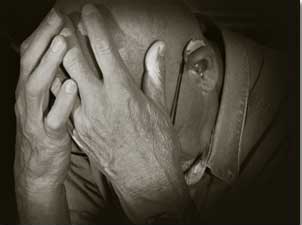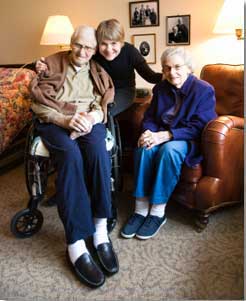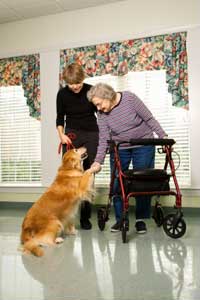
- Depression is a common and serious disorder in older people
- Depression is not part of normal aging
- Diagnosing depression in older people is difficult due to multiple physical complaints and individuals less likely to complain of being “depressed”
- In late life depression worsens physical function, increases suffering, increases use of health care resources, and increases mortality from medical conditions and suicide.
- Depression in older adults tends to be chronic and recurring but can be very treatable resulting often in major functional, social, and health gains for the patient and the caregivers.
What is Depression?

- Major depression is diagnosed when a number of symptoms are present for at least two weeks including depressed mood or loss of pleasure or interest in ordinary activities that were once enjoyed as well as the following:
- Decreased energy
- Sleep disturbance
- Inappropriate or excessive feelings of guilt
- reduced ability to think and concentrate
- psychomotor agitation or retardation (e.g. being fidgety or very slowed down)
- Thoughts of suicide or recurrent thoughts of death
- *These symptoms must cause clinically significant distress or impairment in social, occupational, or other important areas of functioning.
- The elderly often have significant depressive symptoms that need to be monitored without the full picture of major depression.
Risk Factors for Depression

- Female gender
- Being widowed or divorced
- A previous history of depression
- Brain changes due to vascular problems
- Personality types, especially those with lifelong problems developing close relationships
- Major physical and chronic disabling illnesses
- Certain medications such as some antihypertensives, steroids, etc.
- Excessive consumption of alcohol
- Social factors such as social disadvantage and low social support
- Providing care to a significant other person affected by a major disease
Special Features of Depression in Late Life
- Other medical problems confuse the diagnosis and there is a great need for collateral history from family or friends of the patient
- Memory problems are common in people with depression and depression can worsen preexisting memory difficulties
- Patients with first time onset of depression in late life have less family history of depression and more coexistent medical problems such as strokes.
Treatment for Depression in Late Life
 Antidepressants can be very effective in the elderly
and have a response rate similar to younger adults
Antidepressants can be very effective in the elderly
and have a response rate similar to younger adults
- Antidepressants have more potential side effects in the elderly, including dry mouth, constipation, dizziness, tremor, nausea and vomiting, loss of appetite, drowsiness, insomnia, and greater risk of falls.
- Side effects are often temporary but some may persist.
- Antidepressants in the elderly need to be monitored closely and maintained for at least two years if effective.
Psychotherapy including supportive listening and education should be provided to all patients with depression and some may benefit from more formal talk therapies offered by health care professionals
Electroconvulsive Therapy is usually reserved for more serious depressions but may be a treatment of choice because if its faster action, better results, and less complication than other therapies.
Alternative Treatments: Light therapy and alternative medicines are increasingly used in late life depression with research ongoing as to their effectiveness.
Suicide in the Elderly
- The elderly have one of the highest rates of suicide in North America, especially males.
- The elderly have a higher intent and likelihood to complete suicide when they attempt.
- The majority of older people who commit suicide have a psychiatric disorder, mostly depression.
Canadian Network for Mood and Anxiety Treatments
- The Ultimate goal of CANMAT is to improve the quality of life of persons experiencing mood and anxiety disorders, through conduct of innovative research.
Canadian Mental Health Association
- Learn how to take care of your mental health. Get the facts about mental illness. Learn about the programs and services provided by CMHA in the Edmonton region.
Canadian Coalition for Seniors Mental Health
- The Canadian Coalition for Seniors’ Mental Health (CCSMH) is an active collaboration of national and provincial organizations and individuals who are committed to promoting seniors’ mental health by connecting people, ideas, and resources.